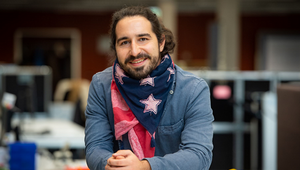Vice-Rector Christopher Lindinger presented Richard Küng with his venia legendi/habilitation certificate.

Richard Küng is a computer scientist and physicist but above all, he is a mathematician. He actively conducts research on future-oriented topics, including quantum computers, at the Institute for Integrate Circuits. Küng was presented with his habilitation/post-doc certificate in the subject area of Theoretical Computer Science. His post-doctoral dissertation titled "Rigorous and Non-Asymptotic Theory Support for Near-Term Quantum Computers" reveals that quantum technology is already outperforming the top conventional supercomputers. Küng added: " ... only for the moment though, and as part of very specified challenges. The potential is there, however, and we just need to learn how to harness that potential."
Those pursuing a habilitation/post-doc undergo an academic evaluation in regard to special qualifications that proves their ability to independently conduct academic/scientific research and teach the entire depth and breadth of their selected subject area [facultas docendi], This, in turn, is the prerequisite to grant authorization to teach that particular subject area [venia legendi].
About Richard Küng
Küng studied Interdisciplinary Sciences and Physics at ETH Zurich. He earned his doctorate degree summa cum laude at the University of Cologne in 2016. After spending time in Berlin (Free University of Berlin) and in the USA (at the Institute for Quantum Information and Matter & Department of Computing and Mathematical Sciences, California Institute of Technology), he came to the JKU in 2020. He has received numerous awards and accolades in recognition of his outstanding work, including the "Willi-Studer Prize" (2013), the "Talentförderungsprämie für Wissenschaften" (2017), and the "Applied NISQ Computing Paper Award" (2021). To date, Richard Küng has published 53 academic and scientific articles.
 Go to JKU Homepage
Go to JKU Homepage










